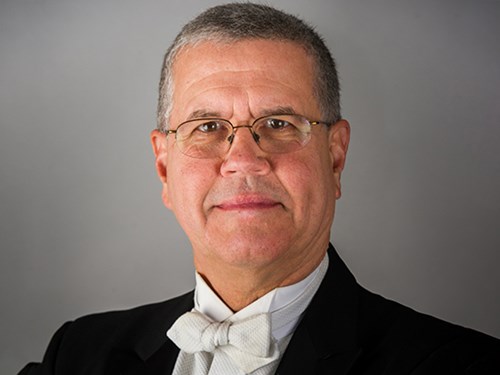The MCR Interview
A Preview of Nashville Symphony’s ‘Modern Masterpieces for Brass’ with Tubist Gilbert Long
The Nashville Symphony will present ‘Modern Masterpieces for Brass’ at Schermerhorn Symphony Center on Wednesday, March 8, 6:00 p.m., as part of the Chamber Music Series. This free event will feature the following Nashville Symphony musicians:
Alec Blazek, trumpet
William Leathers, trumpet
Patrick Walle, horn
Paul Jenkins, trombone
Gilbert Long, tuba
Music City Review had the opportunity to connect with Gilbert Long about this upcoming performance. Mr. Long joined the Nashville Symphony in 1978. Long’s storied career as an orchestral musician, studio recording artist, and collegiate instructor, among other capacities, is balanced with his hobbies of golfing, motorcycling, and biking. Gil is married to Erin Long – a former violinist in the Nashville Symphony. The couple have two daughters, Hannah and Jessica.
Music City Review (MCR): The Nashville Symphony’s ‘Chamber Music Series’ is described as being, “. . . an informal and interactive concert-going experience.” What might attendees expect? Should shy introverts, like myself, be nervous?
Gilbert Long (GL): The ‘Modern Masterpieces for Brass’ concert is really just what one might expect of a normal concert, but with a relaxed environment. The musicians will talk about the pieces performed and brass chamber music in general. There can even be an opportunity for audience members to ask questions of the musicians during the concert.
MCR: Are you allowed and willing to share any of the works expected to be performed? The website states that the program is, “To be announced.”
GL: At this stage we are still working to finalize the program. Rehearsal time is difficult to find due to the ensemble musicians’ busy schedules. Soon we will read through potential repertoire and determine which pieces work well together, while also considering how much rehearsal time is available. We want to be able to provide a wide range of composers and styles to demonstrate a diverse sampling of brass literature. Of the modern music that we will read through, the following composers are being considered: Kenneth Amis, Jennifer Higdon, Eric Ewazen, and David Sampson.
MCR: How was repertoire chosen – and by whom? Are there similarities with the way in which repertoire is selected for the Nashville Symphony?
GL: Choosing music for the Nashville Symphony is completely different from the process used for this upcoming chamber concert.
For the Nashville Symphony, musicians are asked to submit repertoire suggestions to the Artistic Committee. The Artistic Committee is comprised of a combination of peer-elected musicians from the Nashville Symphony, staff members, and the Music Director. The Music Director ultimately organizes programs for the season.
Preparing the ‘Modern Masterpieces for Brass’ concert, all five musicians offer repertoire suggestions. Since each ensemble member has different chamber music experiences, this results in a more-varied list of potential repertoire than if only one ensemble member chose the program. We next attempt to secure the music – members already own some of the music suggested and sheet music needs to be found for other pieces. From there, reading rehearsals occur, where the group collectively decides which pieces should be programmed given the time restraints for subsequent rehearsals, as well as which repertoire pairings create an enjoyable program. In our situation, with so little time to rehearse, familiarity with the music helps speed-up the learning process.
MCR: Explain the rehearsal process for this chamber music program. How does the process relate to that utilized for a typical Nashville Symphony concert cycle?
GL: The rehearsal process is very different. The Nashville Symphony rehearses and performs repertoire within one week to ten days of a performance. The conductor leads the entire process. For this chamber music program all five musicians have a role in picking the program, deciding on a rehearsal schedule, and interpreting the music.
MCR: Describe the role that chamber music has played in your development as a student, professional musician, and educator.
GL: For me, chamber music is very important! In a large ensemble a conductor is responsible for a significant portion of deciding how the music is interpreted. In a chamber music setting, one is completely in control of one’s own contribution. Chamber music accelerates certain aspects of performance: how one interacts with other performers, the ability to adjust to what one hears, and the process of forming one’s own interpretations of the music. Performing in a chamber setting is important to the development of one’s personal style, character, and creativity. Each musician brings their talent and personality to the ensemble.
MCR: With respect to chamber ensembles, what advice do you have for aspiring musicians about performing in this medium?
GL: When I was younger there were very few original compositions written specifically for brass quintet. We mostly played arrangements; many were not even that good. Within the last forty years, there is now an amazingly large selection of arrangements and original compositions for this medium. Students should try playing a wide variety of music styles. Do not be intimidated by pieces that look too hard or ignore pieces that look too easy. I encourage aspiring musicians to learn what challenges them both musically and technically, and then seek out that type of repertoire.
MCR: Help us diversify our listening outside of classical music. What soundtrack is playing when you ride your motorcycle?
GL: In general, motorcycle riding is the great escape. It clears my mind. The helmet is kind of an isolation chamber for my brain. The soundtrack playing is my own thoughts. It’s cheaper than therapy!



